China's Defense Ministry spokesman Wu Qian leaves as journalists are asking question on Hong Kong's recent protests after a press conference at the State Council Information Office in Beijing, Wednesday, July 24, 2019. China says it will not "renounce the use of force" in efforts to reunify Taiwan with the mainland and vows to take all necessary military measures to defeat "separatists." (AP Photo/Andy Wong)
The Associated Press
BEIJING (AP) - China on Wednesday accused the U.S. of undermining global stability with unilateral policies and "power politics" in the Chinese Defense Ministry's first comprehensive outline of its policies since President Xi Jinping came to power.
The U.S. was the first country mentioned in the document's opening section about "prominent destabilizing factors" and "profound changes" in the international security environment.
"The U.S. has adjusted its national security and defense strategies, and adopted unilateral policies," China said in the document. "It has provoked and intensified competition among countries, significantly increased its defense expenditure ... and undermined global strategic stability."
The document is China's first comprehensive national defense white paper published since the 18th National Party Congress in 2012, said Hu Kaihong, a spokesman for the State Council Information Office. It is the 10th white paper of its kind since 1998.
The white paper said China will not renounce the use of force in efforts to reunify Taiwan with the mainland and vowed to take all necessary military measures to defeat "separatists."
China listed among its top priorities its resolve to contain "Taiwan independence" and combat what it considers separatist forces in Tibet and the far west region of Xinjiang. While highlighting China's "defensive" approach, the report also pledged to "surely counterattack if attacked."
China's paramilitary police have helped Xinjiang authorities "take out 1,588 violent terrorist gangs and capture 12,995 terrorists," the report said. The U.S., independent analysts and human rights groups have estimated that around 1 million Muslims have been detained in internment camps as part of what the government calls a counter-terrorism campaign.
Former Uighur and Kazakh detainees and their families have accused China of punishing religious expression and separating children from their parents. They say members of their predominantly Muslim ethnic groups have been arbitrarily detained and subject to political indoctrination.
China has long called the Dalai Lama a dangerous separatist. But the exiled Tibetan Buddhist spiritual leader maintains that he only wants a greater degree of autonomy for the region.
Defense Ministry spokesman Wu Qian said the threat of Taiwan separatism is growing and warned that those who are seeking Taiwan independence will meet a dead end.
"It anyone dares to separate Taiwan from China, the Chinese army will certainly fight, resolutely defending the country's sovereign unity and territorial integrity," Wu said.
Taiwan, a democratically governed island, split from the Communist Party-ruled mainland China amid civil war in 1949. China maintains that Taiwan is part of its territory and seeks "complete reunification."
The U.S. has repeatedly raised Beijing's ire by selling arms to Taiwan. While the U.S. does not have formal diplomatic ties with Taiwan, U.S. law requires that it provide Taiwan with sufficient defense equipment and services for self-defense.
Earlier this month, the U.S. tentatively approved a sale of $2.2 billion in arms to Taiwan - a proposal which had prompted China to threaten sanctions against the U.S. Taiwan's defense ministry said it made the request in light of a growing military threat from China.
The white paper also pointed to U.S., Japanese and Australian moves to beef up their military presence and alliances in the Asia-Pacific as bringing uncertainties to the region.
The U.S. deployment of a missile defense system in South Korea has severely undermined the regional strategic balance, the report said. It further noted Japan's reinterpretation of its post-World War II constitution to allow its military to operate farther from its shores.
China's military expansion in recent years has prompted concerns among other Pacific countries in a region long dominated by the U.S. Navy. China's development of anti-ship ballistic and cruise missiles in particular has been seen as an effort to deter U.S. military and naval access to parts of the Asia-Pacific region.
"China exercises its national sovereignty to build infrastructure and deploy necessary defensive capabilities on the islands and reefs in the South China Sea, and to conduct patrols in the waters of Diaoyu Islands in the East China Sea," said the white paper, referring to disputed waters and islands, which Japan calls the Senkaku Islands.
___
Associated Press writer Ken Moritsugu in Beijing contributed to this report.
China's Defense Ministry spokesman Wu Qian listens to a question from a journalist during a press conference at the State Council Information Office in Beijing, Wednesday, July 24, 2019. China says it will not "renounce the use of force" in efforts to reunify Taiwan with the mainland and vows to take all necessary military measures to defeat "separatists." (AP Photo/Andy Wong)
The Associated Press
FILE - In this Nov. 24, 2018, file photo, supporters of the opposition Nationalist Party cheer in Kaohsiung, Taiwan. China says it will not "renounce the use of force" in efforts to reunify Taiwan with the mainland and vows to take all necessary military measures to defeat "separatists."(AP Photo/File)
The Associated Press
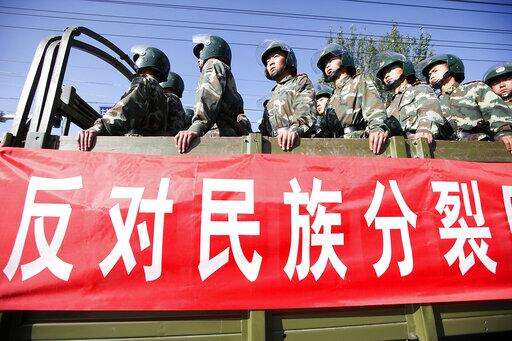
FILE - In this Thursday, July 9, 2009, file photo, paramilitary police on board a truck with a banner which reads " against ethnic separatist" in the aftermath of ethnic violence that killed 156 people in Urumqi, western China's Xinjiang region. China says it will not "renounce the use of force" in efforts to reunify Taiwan with the mainland and vows to take all necessary military measures to defeat "separatists." In a national defense white paper released Wednesday, July 24, China listed among its top priorities its resolve to contain "Taiwan independence" and combat what it considers separatist forces in Tibet and the far west region of Xinjiang.(AP Photo/Eugene Hoshiko, File)
The Associated Press
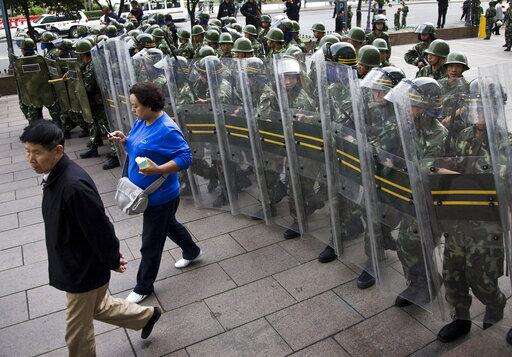
FILE - In this Saturday, Sept. 5, 2009, file photo, Chinese paramilitary police form a line as they disperse the crowds after the unconfirmed report of a needle attack on a boy outside the People's Square in Urumqi, Xinjiang province, China. China says it will not "renounce the use of force" in efforts to reunify Taiwan with the mainland and vows to take all necessary military measures to defeat "separatists." In a national defense white paper released Wednesday, July 24, 2019, China listed among its top priorities its resolve to contain "Taiwan independence" and combat what it considers separatist forces in Tibet and the far west region of Xinjiang. (AP Photo/Andy Wong, File)
The Associated Press
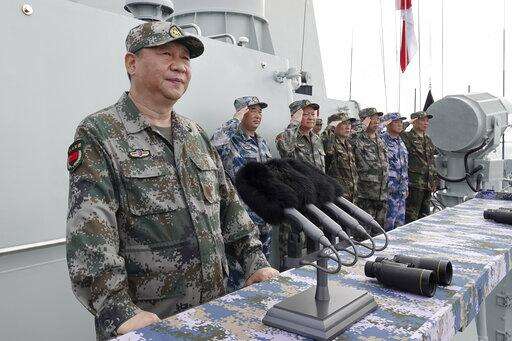
FILE - In this April 12, 2018, file photo released by Xinhua News Agency, Chinese President Xi Jinping speaks after reviewing the Chinese People's Liberation Army (PLA) Navy fleet in the South China Sea. Xi is calling on the PLA to better prepare for combat, amid tensions over Taiwan and the South China Sea. China says it will not "renounce the use of force" in efforts to reunify Taiwan with the mainland and vows to take all necessary military measures to defeat "separatists." (Li Gang/Xinhua via AP, File)
The Associated Press
FILE - In this Tuesday, March 10, 2015, file photo, a Tibetan exile shouts slogans against China after being detained inside a police bus during a protest in New Delhi, India. China says it will not "renounce the use of force" in efforts to reunify Taiwan with the mainland and vows to take all necessary military measures to defeat "separatists." (AP Photo/Altaf Qadri, File)
The Associated Press
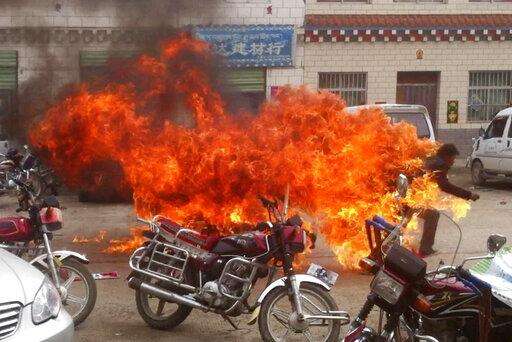
FILE - In this file image made from amateur video footage released by the Tibetan Youth Congress, a Tibetan runs in flames in his self-immolation to protest against Chinese rule, on a street in Yushu prefecture in China's Qinghai province Wednesday, June 20, 2012. China says it will not ârenounce the use of forceâ in efforts to reunify Taiwan with the mainland and vows to take all necessary military measures to defeat âseparatists.â In a national defense white paper released Wednesday, July 24, 2019, China emphasized its resolve to combat what it considers separatist forces in Tibet and the far west region of Xinjiang.(The Tibetan Youth Congress via AP, File)
The Associated Press
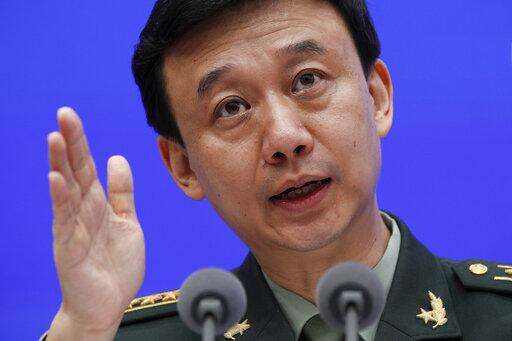
China's Defense Ministry spokesman Wu Qian gestures as he speaks during a press conference at the State Council Information Office in Beijing, Wednesday, July 24, 2019. China says it will not "renounce the use of force" in efforts to reunify Taiwan with the mainland and vows to take all necessary military measures to defeat "separatists." (AP Photo/Andy Wong)
The Associated Press
Defense Ministry spokesman Wu Qian gestures as he speaks during a press conference at the State Council Information Office in Beijing, Wednesday, July 24, 2019. China says it will not "renounce the use of force" in efforts to reunify Taiwan with the mainland and vows to take all necessary military measures to defeat "separatists." (AP Photo/Andy Wong)
The Associated Press
Defense Ministry spokesman Wu Qian speaks during a press conference at the State Council Information Office in Beijing, Wednesday, July 24, 2019. China says it will not "renounce the use of force" in efforts to reunify Taiwan with the mainland and vows to take all necessary military measures to defeat "separatists." (AP Photo/Andy Wong)
The Associated Press